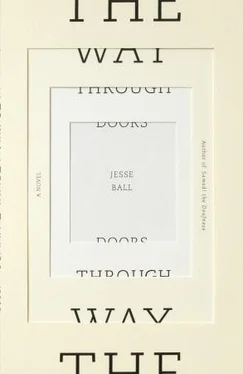Then you came in, looking at me in this funny, I-have-never-seen-you-before sort of way. I smiled. You reached out and touched my face, and then I came closer to you. I came closer and then closer still and started to kiss you. Your hands moved around me, and I felt bathed in the odd sort of light that I had always hoped would accompany my life. Afterwards we lay out on the roof on blankets and talked of what crimes we would commit.
— I think, said the pamphleteer, that you’re thinking of a different guy. I’m not that clever.
— I know who I’m thinking of, said Sif, taking a sip of her wine.
A little turtle had come into the room. It rubbed up against the pamphleteer’s leg. Somehow there was no longer anything on the table. It had happened, as it sometimes does in good restaurants, that the waiter was able to remove everything from the table without anyone noticing. The pamphleteer lifted the turtle up onto the table. There was a note tied to its leg. He took the note and opened it. The note said,


Without pause then, the municipal inspector returned to the Seventh Ministry. The streets were loud with winter, that is, loud with the winter sort of quiet that the snow brings. Amidst it, the municipal inspector hurried. He wore over his customary gray-blue suit an overcoat as well as gloves and the sort of hat that a fighter pilot would wear when not in his plane.
He crossed the small park that adjoined the Seventh Ministry. No one had shoveled the walkway.
He said to himself then, Either no one is there, which has never happened, or all this snow has fallen since they arrived. Or, he added, they arrived by a different route.
He opened the door and entered. Rita was sitting behind her desk wearing a strapless thin wool dress with a pair of wool mittens tied together and thrown over her shoulder, one in front, one behind. Her hair was up in a French braid, and she was in the midst of writing out a message.
— You! she said. You were supposed to meet me yesterday for tea at the Covenant Café in the old subway station. What happened?
— I’m sorry, said Selah. I was imprisoned in a Victorian house by a cruel man named Patrick and his crueler wife, a woman named Caroline.
— I don’t believe that at all, said Rita the message-girl. If so, how did you get out?
— I don’t remember, said Selah. The circumstances are unclear.
— Ah, said Rita. What if I were to say, The circumstances are unclear; I don’t know what happened to your messages? What if I was to say, the circumstances are unclear, I don’t know what happened to the person who is upstairs waiting in your office? He has been here so long that I had to bring him four cups of tea and four petit fours.
— You’re a darling, said Selah. I will make it up to you. You remember that Darger original I stole from that Wall Street office? I’ll give it to you. It has the little girls all rolled up in carpets.
Rita’s eyes flashed with sudden delighted avarice.
— Really? You will?
— It’s yours, said Selah.
After all, he thought to himself, I have three others, and it’s not fair for one person to have that much of a good thing. Not fair at all. I wonder what would happen, he thought, if a child stared at Darger artwork the entire time he was growing up. Would he be able to do a strange mathematics that no one had ever conceived? Or would he just become very good at helping little girls who were engaged in child-slave rebellions?
— Upstairs, you say? asked Selah.
— Yes, he’s upstairs, she continued.
Selah hurried down the hall, climbed up the ladder, and passed through his own fine door into his glorious, comfortable, lovely office, a place he delighted in and was always happy to return to. Seated upon a leather sofa in the center of the room and staring calmly out the window at the falling snow sat Selah’s uncle. He was holding in his hand a copy of a book. On the cover it said:
WF 7 J 1978
— Have you read it? cried out Selah suddenly.
— I have, my young man, said his uncle, standing and giving to Selah a resounding hug, the sort of hug that can be given only in winter when one is wearing a great quantity of clothing.
— And? asked Selah. Did you like it?
— My boy, said Selah’s uncle, it is a very fine piece of work, very fine indeed. Nothing like those first stumbling attempts that I heard tell of at the start of your career.
His uncle flipped through the WORLD’S FAIR. It was filled with diagrams, typographical displays of excellence, painted pages, watercolor glimpses of pyramids from 1912, photographs of French villages in the fifteenth century, names of obscure people who had figured prominently in history without any credit. He flipped through its pages slowly and delicately. Selah could tell by the way that his uncle touched the pamphlet that he had for it a large and careful affection. Selah’s heart swelled.
— I think, said his uncle, that it was the right thing, the very right and proper thing, to install you here. This Rita is a swell gal. Levkin of course is Levkin, and not to be spoken about save in great need. However, we will note in passing his great importance to the life of the city. And the Seventh Ministry itself, why, I had not been down here in some time. You have made quite a comfortable place for yourselves here.
Just then the intercom on Selah’s desk started to shake. Selah pressed a button.
— Selah, it’s Levkin. We’ve got something else for you to see.
— All right, Mars, said Selah. I’ll be down in a jiffy.
He released the button and turned back to the room.
— Make that two jiffies, said his uncle. I have one more thing to tell you.
Selah pressed down the intercom again.
— Make that two shakes of a cat’s tail, he said. Rather than a jiffy.
— Noted, said Levkin. Over and out.
Selah’s uncle had gone over to the window. He pressed his hands up against the cold glass. He could feel the cold of the streets now on his fingers, the cold of this city that was his, he felt, more than any man’s. For it was to some degree this man’s power that infused the city and ran it from day to day, although he was no mayor, and he went unnamed each day down the avenues. In his head he thought, When I was a young boy, out in the lots and playgrounds of my small town, I never dreamed that there would be so many worlds between that day and this.
Selah took his coat off, hung his hat on a hook, folded his suit coat and settled it over the back of a chair, rolled up first his left sleeve, then his right, leaving his left sleeve less rolled, and joined his uncle by the window.
— What more? he asked.
— A dog would lie and tell you that it has not been petted yet on a given day no matter how many times you were to pet it. This is the way with dogs. They want to be petted, to be joined by their master and let live in his radius. What is a lie to a dog? They do not place things in human places. To a dog, whatever brings his master close by is good, and whatever keeps him away is bad. This is how all morals work.
— I believe as you, said Selah, though I did not know it was your way.
— Or let us say that a bird decides one day that it can be a man. Well, already it is walking upon two legs. Is it so far for the bird to learn to speak as a man does, to learn to wear clothing, to handle its wings as a man handles his arms, to learn to grasp objects in hands, to come of one’s own accord in and out of human spheres, counting oneself a human being?
Читать дальше













